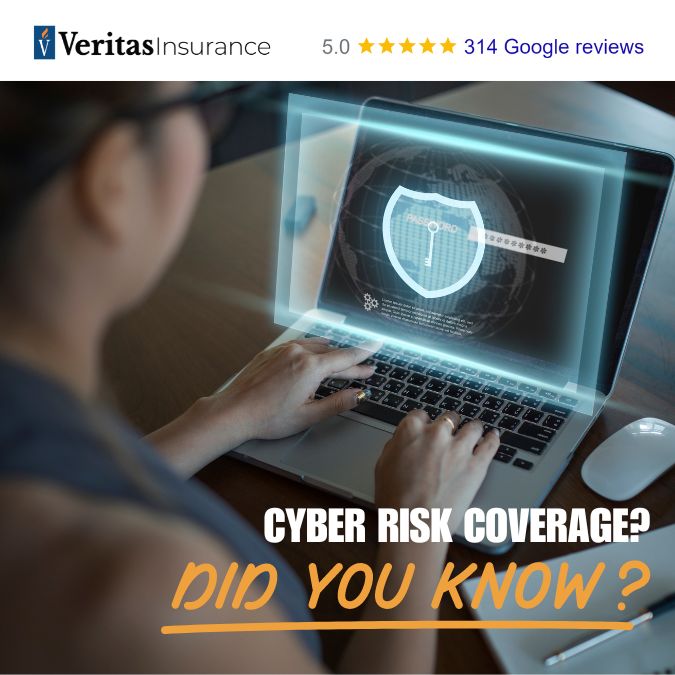The rise in cyber threats and attacks has massively impacted various entities – from private companies to specialist firms to government agencies – resulting in financial loss and reputational damage. TechTarget published 10 of the biggest ransomware attacks on organizations in the United States throughout 2023, including the ransomware attack on the U.S. Marshals Service, in which the attackers gained access to sensitive law enforcement data. This included information about individuals under USMS investigation and some employees, and the attack on California-based Prospect Medical Holdings. It also compromised data and resulted in several days of business disruption.
Cyber risk coverage, also known as cyber insurance, has become essential in today’s digital age. Owners of businesses should protect themselves against potential financial losses and reputation damage. Whether your business is big or small, you are vulnerable to damage due to various cyber threats and incidents.
In this detailed guide, I delve into the important aspects of cyber incident insurance that are highly essential for businesses and individuals looking to protect their sensitive data and minimize the impact of cyber incidents. Based on my 26 years of experience in the insurance industry and serving tens of thousands of clients, I will provide you with a reliable overview of cyber risk coverage.
What Is Cyber Insurance
Cyber insurance, also known as cyber risk insurance, is a type of insurance policy that covers a range of risks and liabilities associated with computers, phones, and other devices, whether they are connected to the internet or not. It provides financial protection against cyber threats and helps you and your business recover from cyber attacks, security breaches, and data loss.
Cyber insurance policies typically cover cyber extortion, business interruption, data breach costs, legal costs, and regulatory investigations among other things.
What Are The Key Components of Cyber Insurance
There are several key components of cyber insurance that you should be aware of. Cyber insurance policies can cover both 1st party (covering you and your direct losses) and 3rd party (covering you for your damage to someone else) incidents. These components provide coverage for different aspects of cyber risk and help businesses and individuals safeguard sensitive information and financial well-being. Let’s explore some of the key components of cyber insurance in more detail.
Network Security
This is one of the most important components of cyber insurance as it protects you and your business from financial loss and liability resulting from network security breaches and cyber threats. Typically, this provides coverage against system outages, cyber-attacks, and operational cyber risks. It also covers the costs of legal defense and regulatory investigations in case you experience a security breach or cyber event. This is generally considered third-party coverage but some of the best cyber insurance policies include some first-party coverage as well.
Privacy Liability
Privacy liability coverage protects you against the disclosure of personal information such as social security numbers and financial data. It can also include coverage for negligence allegations and contractual obligations related to data breaches. Third-party coverage is protection when someone else makes a claim against you for your damages. This would be an example of third-party coverage.
Errors and Omissions
 Errors and omissions coverage under cyber insurance policies protects you against mishandling of personal data and cyber risks in your professional capacity. This can be included in the cyber insurance coverage for businesses such as IT professionals, web developers, and programmers.
Errors and omissions coverage under cyber insurance policies protects you against mishandling of personal data and cyber risks in your professional capacity. This can be included in the cyber insurance coverage for businesses such as IT professionals, web developers, and programmers.
This coverage protects you if you do something negligent that causes your client to be damaged. This could include not installing an update on a client’s system or leaving an opening in an application that allows malware or ransomware to be installed. Other professionals such as Real Estate Agents, Lawyers, and Accountants will have a traditional insurance policy just for their E&O Coverage.
Data Breach
Data Breach provides insurance coverage for losses related to data breaches. It can help you cover expenses such as legal fees, data recovery, and data breach notifications. Many insurance companies offer data breach insurance as part of their business owner policies.
At Veritas, we represent many insurance companies that do just that but keep in mind, that these endorsements or add-ons to your business policy do not offer as broad of coverage as a cyber insurance policy from a company that specializes in the cyber insurance market. You will want to pick a cyber insurance policy that offers credit monitoring services in the event of compromised data.
Network Business Interruption
This coverage protects you against operational cyber risks, reputational damage caused by cyber threats and system failures, privacy breaches, customer information loss, and traditional professional services. This can also include first-party coverage by your insurance company for loss of business income.
Media Liability
Media liability coverage gives protection against financial losses and legal expenses stemming from cyber events, social engineering, and network security breaches, generally on websites. Moreover, it encompasses insurance for online advertising, intellectual property infringement, contractual obligations, and media liability allegations.
Social Engineering and Reputational Harm
Social engineering attacks use human psychology to gain access to sensitive information. In the past few years, we have seen several affected customers tricked into wiring money to the wrong baking account due to Social Engineering from a cyber security incident. Cyber risk coverage protects against financial loss due to reputational damage following security breaches. Insurers such as the ones we partner with at Veritas offer cover for reputational damage, including PR and crisis management expenses.
Who Should Consider Cyber Risk Coverage?
Cyber risk coverage needs to be considered by businesses of all sizes and industries. This is especially true for organizations that use technology to store and transmit sensitive data, handle customer information, financial data, any other type of confidential information, or even individuals that use a computer. So, that is pretty much everyone!
 Businesses and Cyber Risk Coverage
Businesses and Cyber Risk Coverage
Companies need to protect themselves from the risks of network security breaches, which can lead to high legal costs and the cost of recovering lost data. This is where cyber risk coverage comes into play. This type of cyber insurance coverage not only covers the basics but also helps businesses handle personal data with care, minimize reputational damage, and protect against the impact of unexpected disruptions by including Risk Management Tools to mitigate cyber risk.
It also provides protection against more sophisticated threats such as social engineering attacks and media liability issues. Essentially, cyber liability insurance is an important part of any company’s protection strategy, especially for those who handle sensitive information such as credit card numbers.
Individuals and Cyber Risk Coverage
Individuals can benefit greatly from cyber liability insurance. It protects them from identity theft and the loss of important data. This type of insurance isn’t just for businesses; it provides financial protection if someone steals your credit card information or gets their hands on your sensitive personal data, such as health records. In addition, with cyber risk insurance, you’re also covered against things like cyber extortion and the theft of your social security number.
What Cyber Insurance Doesn’t Normally Cover
 Cyber insurance policies have their own limitations and often don’t cover certain areas such as regulatory investigations and penalties. There are also limitations on coverage for operational risks associated with cyber activities and liability for online advertising. In addition, the scope of coverage for forensic investigations and activities related to law enforcement may be limited in cyber insurance policies.
Cyber insurance policies have their own limitations and often don’t cover certain areas such as regulatory investigations and penalties. There are also limitations on coverage for operational risks associated with cyber activities and liability for online advertising. In addition, the scope of coverage for forensic investigations and activities related to law enforcement may be limited in cyber insurance policies.
Important note: Your insurance company may set limits on cover for system failures, claims, social engineering, fraud from financial institutions, costs related to media liability, contractual obligations, and allegations of negligence.
How Do I Choose the Right Cyber Insurance Policy
Choosing the right cyber insurance policy requires a little homework.
First, consider what data your company works with and what security risks might exist. You should find a cyber liability insurance policy covering a wide range of cyber threats, from data breaches to more hidden risks, often called silent cyber exposure. Fortunately, many insurance companies such as Veritas, can tailor cyber insurance coverage and offer solutions to your company’s cyber risks. It’s also encouraging to see examples of businesses that have been protected by cyber insurance, which shows just how valuable this coverage can be.
Second, for businesses interested in cyber liability insurance, it’s important to understand the different elements that will affect the cost of your policy. Insurance companies will look closely at how well your business handles risks, the risk management techniques you have in place, what type of cyber coverage you’re seeking, and how vulnerable you are to security threats.
You should know how premiums are calculated and what options you have to customize your policy to suit your needs. In addition, you can keep your costs down by taking effective risk mitigation measures and having a solid response plan ready in case of an emergency.
Pro Tip: When going through your cyber liability insurance quote, it’s important to look closely at what each policy covers and what its limits are. Key points include whether the cyber insurance policy protects against various cyber threats, covers costs associated with data breaches, and includes legal defense costs. It’s also worth checking the insurance provider’s reputation, financial stability, and treatment of its customers. Don’t forget to look at the details too, such as the excess, any waiting periods before cover kicks in, and the ability to add additional protections to make your cyber liability insurance as robust as possible. IT IS BEST TO WORK WITH A PROFESSIONAL INSURANCE AGENT because there is no industry standard form and the fine print is different on almost every policy. At Veritas, it is our job to know these things, and we would love to work with you.
How Much Does Cyber Insurance Cost?
When choosing a cybersecurity insurance policy, it’s important to consider the size of your business and the level of risk it’s exposed to. It would be best if you aimed for a policy that protects against both first-party coverage and third-party losses and covers everything from data breaches to business interruption.
The price of cyber insurance can vary greatly depending on the scope of coverage and the size of your business. To ensure you get the best deal, you should get quotes from multiple insurance providers and work with your insurance agent to compare them. This way, you can find a policy that meets your specific needs and whose costs fit within your budget. At Veritas, we partner with various insurance companies to find an insurance policy that fits your needs.
What Is The Most Common Misconception about Cyber Insurance Coverage
The most common misconception about cyber liability insurance is that is only for big corporations. The truth is, it’s accessible and affordable for businesses of all sizes. It’s worth noting that small businesses aren’t flying under the radar when it comes to cyber-attacks; they’re targets too, which underlines the importance of having a cyber-attack and risk insurance in place.
Is Cyber Insurance Worth the Investment?
Cyber insurance is a valuable investment for companies and it is less expensive than you might think. It provides financial and network security coverage against cyber-attacks and data breaches and covers the costs of legal fees, data recovery, and customer notification. It is essential to mitigate cyber risks and threats and also protect businesses from losses due to network security failures and provide coverage for reputational damage and data protection liability.
Conclusion
In summary, taking out cyber risk coverage is important in protecting your business or personal data from the growing dangers of the online world. This type of insurance protects you against network security breaches, data privacy issues, and errors in your digital operations, among other things. But remember that cyber insurance isn’t a one-size-fits-all solution and may not cover all cyber threats that exist. Effective risk management is just as important, and when choosing the right insurance policy you should look carefully at what is covered by cyber insurance, how much it costs, and how it keeps pace with technological changes.
Contrary to what some may think, investing in cyber insurance is a smart move to protect both your finances and your reputation. So take the time to assess your cyber risks and choose a comprehensive cyber insurance policy to protect yourself in the digital age.

Author’s Bio
Andrew Darlington, an insurance professional since 1997, established Veritas Insurance in 2009. He is the holder of CBIA, CIC, CRM, and AAI certifications, demonstrating a strong focus on cultivating robust client relationships and ongoing education. On his website, you can find comprehensive industry insights, case studies, and expert recommendations, showcasing his dedication to customized solutions and unwavering integrity.

Let's Get Social!
For more information on Cybersecurity and Cyber Liability check out our other articles here.
Complete this form and we will send you the following:
As an added bonus, we will also send you with no obligation:
3. Our Cyber Risk Assessment of your company- by giving us just your domain name, we will run multiple different scans including a dark web check, and reach out with your customized report.






